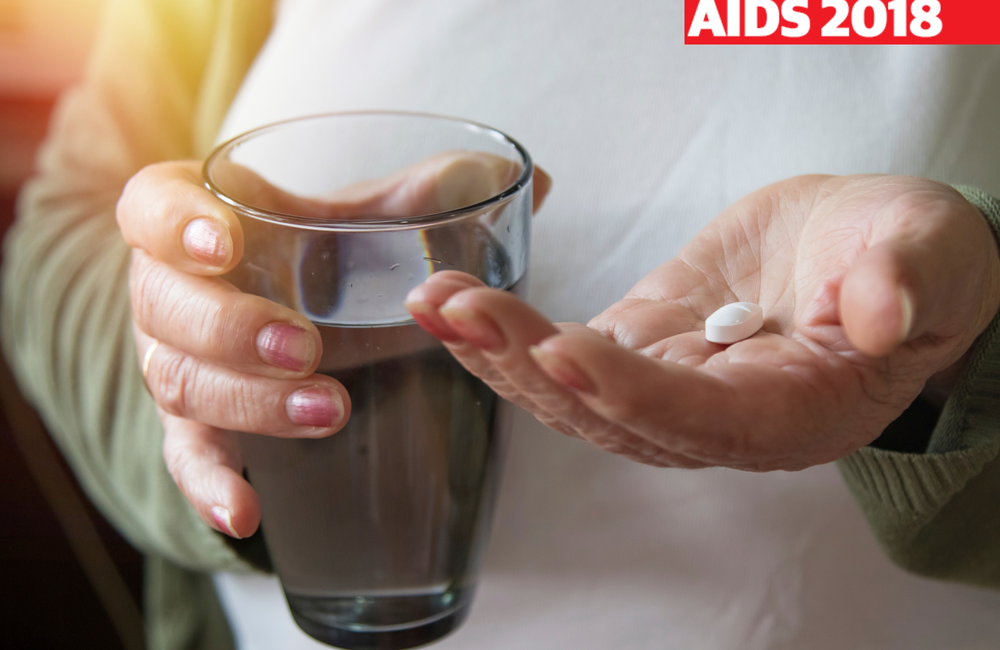
The experimental non-nucleoside reverse transcriptase inhibitor (NNRTI) doravirine was more effective than darunavir/ritonavir over nearly two years of follow-up, according to results of a phase 3 study presented to the 22nd International AIDS Conference (AIDS 2018) in Amsterdam. After 96 weeks, viral suppression (below 50 copies/ml) was observed in 73% of people treated with doravirine compared to 66% of people treated with darunavir/ritonavir. All the patients were antiretroviral naïve at baseline. Only two people developed resistance to doravirine, which also had a mild side-effects profile.
Doravirine is a novel NNRTI. Laboratory studies have shown that it is active against both wild-type HIV and also virus with mutations that confer resistance to other drugs in the NNRTI class. A phase 3 study presented at the IAS 2017 conference showed that a fixed-dose regimen containing doravirine, tenofovir and lamivudine was non-inferior to efavirenz, tenofovir and emtricitabine. Doravirine has been submitted for licensing approval to the US Food and Drug Administration.
A phase 3 study called DRIVE-FORWARD, involving antiretroviral-naïve patients, was designed to see if doravirine was virologically non-inferior to the protease inhibitor darunavir/ritonavir when used in combination with two nucleoside reverse transcriptase inhibitors (NRTIs). After 48 weeks of therapy, 83% of doravirine-treated people were virally suppressed compared to 80% of people randomised to take darunavir/ritonavir. This finding showed the non-inferiority of doravirine.
In the present analysis, the investigators extended follow-up to week 96. As well as reporting on virological outcomes, they also compared rates of treatment discontinuation, safety and changes in lipid profiles associated with the two treatments.
The study was multicentre, randomised and double-blind. A total of 766 people were randomised (383 to each drug). The study arms were well matched. Approximately three-quarters were white and the mean age was 35 years. At baseline, the mean CD4 cell count was 422 cells/mm3 and mean viral load was a little over 25,000 copies/ml.
At week 96, 73% of doravirine-treated people and 66% of individuals in the darunavir/ritonavir arm had a viral load below 50 copies/ml.
Doravirine’s efficacy was regardless of baseline viral load.
Two people who discontinued doravirine without a virological response developed resistance to the drug.
Approximately a third of people in both study arms developed a drug-related adverse event. These were generally mild and consisted of diarrhoea, nausea, headache, upper respiratory tract infections and viral upper respiratory tract infections. Rash developed in 9.4% of doravirine-treated people and 9.7% of those taking darunavir/ritonavir. Neuropsychiatric side-effects were observed in 16% of people taking doravirine compared to 19% of people treated with darunavir/ritonavir.
The rate of treatment discontinuations was modest for both drugs but was consistently lower for doravirine through to week 96.
Changes in blood lipids favoured doravirine. LDL cholesterol fell modestly in people taking doravirine but increased by 14mg/dL among those taking the protease inhibitor. A modest increase in total cholesterol (4.1mg/dL) was seen in the doravirine treatment arm, but the increase among people taking darunavir/ritonavir was 21.9mg/dl. Triglycerides fell by 1.1mg/dl among people taking doravirine and increased by 22.5mg/dl among those taking darunavir/ritonavir.
On the basis of these findings, the investigators conclude that doravirine had greater virological efficacy than darunavir/ritonavir. Other features of the experimental NNRTI included a very low rate of resistance and good safety and lipid profiles.
Molina J-M et al. Doravirine (DOR) versus ritonavir-boosted darunavir (DRV+r): 96-week results of the randomized, double-blind, phase 3 DRIVE-FORWARD noninferiority trial. 22nd International AIDS Conference (AIDS 2018), Amsterdam, abstract LBPEB017, 2018.
View the abstract on the conference website.
Update: Following the conference presentation, this research was published in a peer-reviewed journal:
Molina J-M et al. Doravirine versus ritonavir-boosted darunavir in antiretroviral-naive adults with HIV-1 (DRIVE-FORWARD): 96-week results of a randomised, double-blind, non-inferiority, phase 3 trial. Lancet HIV, online ahead of print, 2019.
